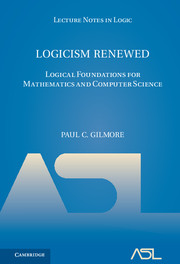Chapter 1 - Elementary Logic
Published online by Cambridge University Press: 30 March 2017
Summary
Language and Logic
The simplest sentences of a natural language have two components: a subject and a predicate. ‘Africa is a continent’ and ‘One-half is a natural number’ are examples. In the first ‘Africa’ is the subject and ‘a continent’ is the predicate, while in the second ‘One-half’ is the subject and ‘a natural number’ is the predicate. The verb ‘is’ asserts that the subject has the property described by the predicate; briefly that the predicate is applied to the subject, or that the subject is an argument for the predicate. The resulting sentence may or may not be true.
Some sentences, although in the subject-predicate form, have a predicate with an embedded subject. For example the sentence ‘London is south of Paris’ has ‘London’ as subject and ‘south of Paris’ as predicate. The subject ‘Paris’ is embedded in the predicate. Indeed the sentence can be understood to have two subjects ‘London’ and ‘Paris’ and a predicate ‘south of’, often called a relation. The number of subjects to which a predicate may be applied is called the arity of the predicate. Thus ‘a continent’ and ‘a natural number’ have arity one, while ‘south of’ has arity two.
From an arity two predicate an arity one predicate can be formed by applying the first of its two subjects. Thus for example ‘south of Paris’ is an arity one predicate. Later, notation will be introduced for the predicate suggested by ‘London is south of’. In a slight generalization of the meaning of predicate, a sentence is understood to be a predicate of arity zero since a sentence results when it is applied to no subjects. Thus ‘Africa is a continent’ and ‘London is south of Paris’ are predicates of arity zero. Generalizing further, it will be assumed that there may be predicates of any given finite arity; that is, predicates which may be applied to any given finite number of subjects.
- Type
- Chapter
- Information
- Logicism RenewedLogical Foundations for Mathematics and Computer Science, pp. 1 - 42Publisher: Cambridge University PressPrint publication year: 2005



